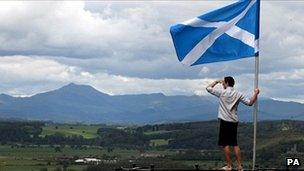Scottish independence: Hopes over referendum wrangles
- Published

Nicola Sturgeon said the debate needed to focus on whether independence would be better for Scotland
The Scottish and UK governments say they are hoping to quickly resolve outstanding wrangles over plans for the independence referendum.
Their comments came ahead of a meeting with First Minister Alex Salmond and Scottish Secretary Michael Moore.
Monday's meeting will come before face-to-face talks between Mr Salmond and the prime minister.
The two sides have disagreed over arrangements to run the ballot, proposed by the SNP for autumn 2014.
Scotland Office minister David Mundell and Scotland's deputy first minister, Nicola Sturgeon, said there was broad agreement over the timing of the vote.
However, the UK government says new constitutional powers must be devolved to Holyrood to make the vote legal, while Scottish ministers have accused the coalition of trying to dictate the terms of the ballot.
There is also still disagreement over the Scottish government's refusal to rule out a second question on the ballot paper, on more powers short of devolution, and giving 16 and 17-year-olds the chance to vote.
Ms Sturgeon told BBC Scotland's Sunday Politics programme: "I think there's now broad consensus in Scotland about the timing of the referendum.
"And we certainly look forward to hearing views about the question or questions that might be in the referendum, and on issues such as do 16 or 17-year-olds have the right to vote."
She added: "There's no doubt at all that the sooner we can get beyond the issues of process and into, as I think many people in Scotland already are, the issue of substance - which is why Scotland would be better off as an independent country with a relationship of equals with other countries of these islands - the better."
Voter debate
Mr Mundell said Monday's meeting between Mr Salmond and Mr Moore would be the start of a "positive process" to getting the referendum sorted out, adding: "For once I actually agree with Nicola Sturgeon - we need to get onto the substance of, from my point of view, why Scotland is better off in Britain.
"I hope that it can be concluded as quick as possible," said the minister.
Mr Mundell said great progress had been made in the last few weeks, given that, at the start of the year, nothing was known about the Scottish government's plans.
He also said lowering the voting age was a "separate debate".
When challenged on a suggestion by Liberal Democrat Mr Moore in the Times newspaper that the UK government would agree to greater financial powers for Holyrood if voters in Scotland elected to stay in the UK, Mr Mundell, a Tory MP, said: "It's quite clear that different parties will go forward with different proposals."
On the ballot paper, the SNP wants to ask the question: "Do you agree that Scotland should be an independent country?"
When Mr Mundell was asked if he agreed with Scottish Tory leader Ruth Davidson that it was a "fair, decisive and legal question", he said: "What Ruth has said is that it is a matter of progress that we've moved forward and now have a simple question of the sort that asks people whether or not they want to stay within the United Kingdom."
Miss Davidson launched her leadership campaign by opposing further new powers for Holyrood beyond those being delivered by the Scotland Bill, currently going through Westminster.
As leader, she later announced a wholesale review of party policy, in which she said no issue would be off the table.
- Published11 February 2012